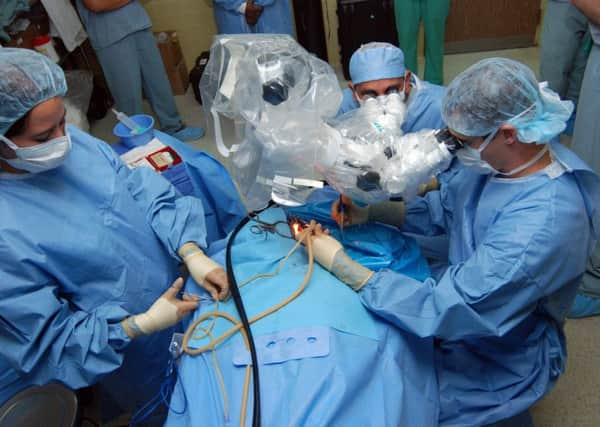Claims some NHS treatments are being '˜rationed'


And claims of rationing led those councillors to call on health chiefs to explain why some procedures will no longer be as readily available.
The range of operations available to fewer patients include knee and hip replacements, prolapse surgery, tonsil removal and gallstone surgery.
Advertisement
Hide AdAdvertisement
Hide AdWith the threshold being raised before patients are offered such treatment, critics said that it was down to cost and cuts in funding.
More health stories: Hundreds march in Brighton to protest cuts to public services
The debate played out at Portslade Town Hall at a meeting of the Brighton and Hove City Council health overview and scrutiny committee.
Advertisement
Hide AdAdvertisement
Hide AdCouncillors were asked to note a report showing an increasing number of treatments where doctors will have to show that patients have a ‘significant clinical need’.
The policy is known as ‘clinically effective commissioning’ and the number of treatments listed under the policy has risen from 39 to 107.
At a previous meeting of the committee last year, Brighton and Hove Clinical Commissioning Group (CCG) chairman Dr David Supple described some of the changes as ‘easy wins’.
He indicated that it was easy to justify stricter criteria for procedures such as plastic surgery and cosmetic facial procedures before the NHS will pay.
Advertisement
Hide AdAdvertisement
Hide AdBut he accepted that there were ambiguities when dealing with some treatments and that others were ‘emotive’.
Green councillor Louise Greenbaum said that she wanted the CCG to give more detail about the decision-making process.
She said: “I do not want to note this report. This is the third or fourth time we have had (clinically effective commissioning) before this committee.
“I hope we provide scrutiny. We have not got the information to do that.
Advertisement
Hide AdAdvertisement
Hide Ad“I ask that the committee gets to see the evidence behind the decision.”
Labour councillor Kevin Allen supported a move to press the CCG to provide evidence of a detailed review of the various treatments.
He said: “We absolutely have to have the details. When this first came out I was criticised because I said it was rationing, which may be vulgar on my part.
“It may be all obvious and clinical but… the cost of the procedures has been balanced against the health benefits. It is rationing.”
Advertisement
Hide AdAdvertisement
Hide AdFellow Labour councillor Mo Marsh supported councillors Allen and Greenbaum, saying: “Yes this is rationing. This is about costs and cuts in funding.
“It is totally appropriate of us when we are really concerned about what is happening in terms of money available in the NHS. I want to have more detail.”
Councillors Greenbaum, Allen and Marsh cited a question from health campaigner Linda Miller, of Sussex Defend the NHS, at the start of the meeting on Wednesday (October 17) as a reason to push the CCG.
Mrs Miller asked if the number of treatments removed from NHS provision was going to be open-ended due to the increasing number.
Advertisement
Hide AdAdvertisement
Hide AdShe said: “When told a particular procedure is not available, patients will face a choice: pay and go private, or go without, which will greatly increase health inequality.
“Noting what NHS England and the CCG are doing to our NHS may not be an adequate response if we want to prevent the creation of a two-tier health service.”
The official response was: “We have noted the expansion of (clinically effective commissioning) but it is important to recognise that … the NHS is recalibrating its approach to ensure that treatment is consistent and most importantly evidence-based.”
CCG director of performance, planning and information Lola Banjoko said that all the procedures affected were available on the NHS but certain criteria had to be met.
Advertisement
Hide AdAdvertisement
Hide AdConservative councillor Carol Theobald questioned this as she said that she was paying privately for one of the restricted treatments.
She said: “I look at things on there such as hip replacements and knee replacements and wonder how long people are waiting. We need more information.”
Councillors reached cross-party agreement as they voted unanimously to support Cllr Greenbaum’s call for details about how the procedures were chosen and justified.
Restricted procedures include some types of alternative therapies, cosmetic or plastic surgery, breast surgery, facial procedures, skin and subcutaneous procedures, and ear, nose and throat procedures, gynaecological surgery, neurological and neurosurgical procedures, ophthalmology, urology, musculoskeletal procedures and foetal alcohol spectrum disorder, asymptomatic gallstones surgery, blepharoplasty, chalazion surgery, circumcision, dilation and curettage, female sterilisation surgery, hallux valgus surgery, reduction mammoplasty, revision or augmentation mammoplasty, rhino/septoplasty, tonsillectomy and trigger finger surgery, arthroscopy or knee washout (in patients with osteoarthritis in the knee), brow ptosis surgery, surgery for carpal tunnel syndrome, excision of haemmorhoids, female genital prolapse or the assessment of stress incontinence, excision of ganglia, the insertion of grommets or ventilation tubes, hernia treatments, hysterectomy for heavy menstrual bleeding, treatment of minor skin lesions, obstructive sleep apnoea surgery in adults, uterine fibroid surgery, varicose vein surgery, knee and hip replacement surgery.
Sarah Booker-Lewis is the Local Democracy Reporter for Brighton & Hove.